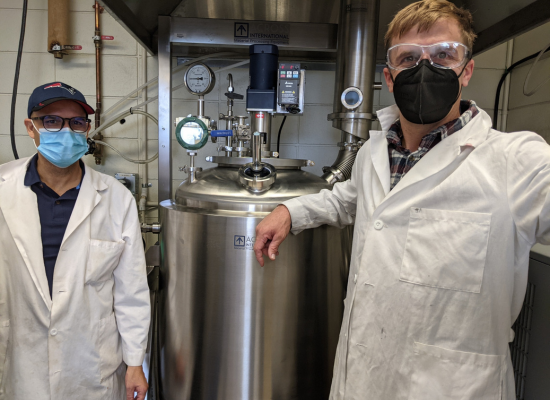Combining high performance and sustainability
From its foundation in 2014, ZILA BioWorks set out to create a new business model that would combine financial success with the protection of the environment as well as assist in transitioning to a sustainable circular economy. ZILA´s goal is to put the planet as a priority and not compromise its health for the production of high-performance materials. The start-up has developed an innovative, low-carbon way to create bio- epoxy for the outdoor industry, however that is just the beginning. This durable biomaterial can be used as an essential component of fibre-reinforced composite materials that make up wind turbine blades, lightweight vehicle materials and other products that play important roles in the greening economy. This platform technology can also be used for coatings and adhesives used throughout the built environment. ZILA´s founders, Jason Puracal and Evan Boucher, met in grad school in an MBA programme for sustainable business. Together, they shared the realisation that a shift from extractive resources to renewable ones needed to happen in favour of a more environmentally friendly economy.
“Materials that don't sacrifice performance for the preservation of the planet. Materials developed with sustainability built into their DNA. Materials shaping a world where circular bio economies are the rule, not the exception”
, states Jason. Furthermore, they saw a market opportunity in the US with the eventual legalisation of industrial hemp. The first five years of the endeavour were spent on market analysis and research to find the highest value product out of the highest value part of the hemp crop. Consequently, ZILA takes hempseed oil and goes through a patented process to produce a bio epoxy resin - the highest class of thermoset plastic. Since focusing on this technology, the start-up faced lots of challenges, from the investment into imperative R&D work including figuring out the chemistry and production processes of epoxy to the assembly of team members with the necessary expertise. After all, the production of epoxy resin systems is a complicated process of finding the right combination of catalysts, accelerants, fillers, colorants and other components.
Not to forget, the start-up set an ambitious goal of trying to innovate in a legacy industry that has been producing epoxies from petroleum in basically the same way for the last 80 years. With over 100 years of subsidies and efficiency gains, the petroleum industry has created multiple different value streams with efficient and low-waste processes. The latter are often held as trade secret and not known to outsiders. Here, the sales processes and the entire supply chain are already established, which a start-up has to first build-up from naught.
In the present day, the company combines team members with valuable and versatile expertise: Jason having decades long experience in sustainability and team building, as well as significant governance experience serving on and reporting to both for profit and nonprofit boards. Evan is a world class athlete and engineer who has experience taking ideas from napkin to full scale production in product manufacturing. Jason and Evan built a team with expertise as multidisciplinary scientists and research directors, outdoor specialists, international finance and tax specialists. Their collaborative approach to business has gained support from numerous research organizations and contributing connections with the largest brand names in the industry. Right now, the company is focusing on scaling-up production.
The name “ZILA” is actually a Buddhist pre-set meaning “harmony” or “do no harm”. The brand name is capitalized, as its meaning represents a big part of the company’s values.
Green innovator vs established giant
Why is there a need to change a well-established sector like the petroleum industry?
For 80 years the chemical industry has been using petroleum-based bisphenol A (BPA) as the backbone of epoxies and other plastics. According to Jason (CEO & Co-founder), these epoxies create a very heavy carbon footprint - over 5 kilogrammes of CO2 per kilogramme of epoxy produced and the epoxy itself is not recyclable either. The few bio-based epoxy competitors in the market are still using BPA as the backbone, however, combine it with a bio-epichlorohydrin to give them about 30% bio content and a 14% reduction in carbon footprint. ZILA's patent technology doubles the bio content and has the potential to cut the embodied carbon in half compared to their nearest competitor without losing performance. Traditional vegetable oil-based epoxies do exist on the market and are produced at scale, but lack in performance, especially for industrial composites. “That's where our technology differs”
, explains Jason. The inherent structure of the polymers (which epoxies are) includes so called dynamic covalent bonds. This “vitrimer” technology allows for a recyclability of epoxies and other materials used in epoxy composite applications, making it attractive for the sustainable chemistry industry. ZILA’s formulated epoxy resin systems are designed in a way that it is easy for manufacturers to substitute traditional, petroleum-based plastics, without having to adopt a new production technology.
ZILA mostly focuses on hempseed oil as a bio-feedstock. Hemp is a carbon sequestering renewable resource. As a multi-use crop, hemp is beneficial to farmers, soil, ecosystem health, and rural communities. ZILA’s use of hempseed oil as a bio feedstock reduces the carbon footprint of their bio-epoxy. So, through full crop utilisation it can be more equitable for farmers upstream, adding to regenerative agriculture and sustainable land use, all important as part of the circular economy approach of the innovation.




